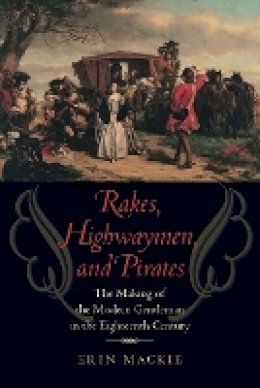
Stock image for illustration purposes only - book cover, edition or condition may vary.
Rakes, Highwaymen, and Pirates: The Making of the Modern Gentleman in the Eighteenth Century
Erin Mackie
€ 43.78
FREE Delivery in Ireland
Description for Rakes, Highwaymen, and Pirates: The Making of the Modern Gentleman in the Eighteenth Century
Paperback. Synthesizing the histories of masculinity, manners, and radicalism, Rakes, Highwaymen, and Pirates offers a fresh perspective on the eighteenth-century aristocratic male. Num Pages: 248 pages, black & white illustrations. BIC Classification: 1DBKE; 3JF; HBTB; JFSJ2. Category: (P) Professional & Vocational. Dimension: 235 x 176 x 18. Weight in Grams: 440.
Erin Mackie explores the shared histories of the modern polite English gentleman and other less respectable but no less celebrated eighteenth-century masculine types: the rake, the highwayman, and the pirate. Mackie traces the emergence of these character types to the seventeenth and early eighteenth centuries, when traditional aristocratic authority was increasingly challenged. She argues that the development of the modern polite gentleman as a male archetype can only be fully comprehended when considered alongside figures of fallen nobility, which, although criminal, were also glamorous enough to reinforce the same ideological order. In Evelina's Lord Orville, Clarissa's Lovelace, Rookwood's Dick Turpin, and Caleb Williams' Falkland, Mackie reads the story of the ideal gentleman alongside that of the outlaw, revealing the parallel lives of these seemingly contradictory characters. Synthesizing the histories of masculinity, manners, and radicalism, Rakes, Highwaymen, and Pirates offers a fresh perspective on the eighteenth-century aristocratic male.
Product Details
Format
Paperback
Publication date
2014
Publisher
Johns Hopkins University Press
Condition
New
Number of Pages
248
Place of Publication
Baltimore, MD, United States
ISBN
9781421413853
SKU
V9781421413853
Shipping Time
Usually ships in 7 to 11 working days
Ref
99-1
About Erin Mackie
Erin Mackie is a professor of English at Syracuse University. She is author of Market a la Mode: Fashion, Commodity, and Gender in "The Tatler" and "The Spectator," also published by Johns Hopkins, and editor of The Commerce of Everyday Life: Selections from "The Tatler" and "The Spectator."
Reviews for Rakes, Highwaymen, and Pirates: The Making of the Modern Gentleman in the Eighteenth Century
The book impresses with its attentive close readings of important texts and makes a valuable contribution to gender studies of eighteenth-century Britain. Times Literary Supplement An engaging study of elite modes of early modern criminality... A richly rewarding volume that gains more than a little residual glamour from its popular subjects. The strength of the text, though, is in Mackie's incisive questioning of that glamour. This is not, finally, a book about pirates (or highwaymen, or rakes) so much as it is a study of our fascination with them.
Ingrid Ranum Journal of Early Modern Cultural Studies Mackie is to be congratulated on the range, scholarship, and critical perception in her study of some disquieting resemblances between deviant masculine types and perfect gentleman.
Carolyn D. Williams Eighteenth-Century Fiction Opens up new avenues for thinking about masculinity, gender, and authority in the long eighteenth century.
Hal Gladfelder 1650-1850 Mackie's impressive work offers a fascinating study of criminal and moral masculinity.
Sarah Elizabeth Fanning Scriblerian In this well-researched study, Mackie makes a strong case for the inclusion of alternative, criminal masculinities in understanding the development of the modern English gentleman and patriarchy in the eighteenth century. Situated at the nexus of gender theory and literary studies, her book adds to the study of modern and late modern cultural norms of gender and sexuality through discourse analysis of literary and nonliterary texts.
Srividhya Swaminathan Journal of British Studies The central concern of this book is the transformation of the 'British gentleman' from the so-called Glorious Revolution through reformulations of patriarchy as exhibited in taste, sensibility, and virtue in the 18th century and beyond. Choice Mackie's book is extremely well-written and engaging, and stands as a wonderful look into categories of male types. Studies of female types have proliferated in recent years, and it is refreshing to see attention paid to the divisions among men in the eighteenth century.
Kathryn Strong Hansen The Eighteenth-Century Current Bibliography
Ingrid Ranum Journal of Early Modern Cultural Studies Mackie is to be congratulated on the range, scholarship, and critical perception in her study of some disquieting resemblances between deviant masculine types and perfect gentleman.
Carolyn D. Williams Eighteenth-Century Fiction Opens up new avenues for thinking about masculinity, gender, and authority in the long eighteenth century.
Hal Gladfelder 1650-1850 Mackie's impressive work offers a fascinating study of criminal and moral masculinity.
Sarah Elizabeth Fanning Scriblerian In this well-researched study, Mackie makes a strong case for the inclusion of alternative, criminal masculinities in understanding the development of the modern English gentleman and patriarchy in the eighteenth century. Situated at the nexus of gender theory and literary studies, her book adds to the study of modern and late modern cultural norms of gender and sexuality through discourse analysis of literary and nonliterary texts.
Srividhya Swaminathan Journal of British Studies The central concern of this book is the transformation of the 'British gentleman' from the so-called Glorious Revolution through reformulations of patriarchy as exhibited in taste, sensibility, and virtue in the 18th century and beyond. Choice Mackie's book is extremely well-written and engaging, and stands as a wonderful look into categories of male types. Studies of female types have proliferated in recent years, and it is refreshing to see attention paid to the divisions among men in the eighteenth century.
Kathryn Strong Hansen The Eighteenth-Century Current Bibliography
